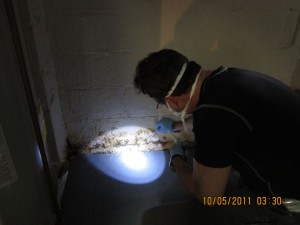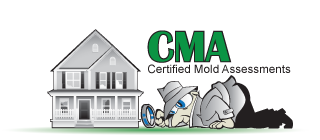 When you learn about how costly a mold invasion can be—both to your property value and to you home—you start to wonder what you can do to prevent it from happening. Waterproofing the basement is one thing that comes up again and again in mold prevention discussions. Homeowners often wonder a) how much it costs, and b) whether it really is an effective mold prevention measures.
When you learn about how costly a mold invasion can be—both to your property value and to you home—you start to wonder what you can do to prevent it from happening. Waterproofing the basement is one thing that comes up again and again in mold prevention discussions. Homeowners often wonder a) how much it costs, and b) whether it really is an effective mold prevention measures.
The cost of basement waterproofing is difficult to pin down, since any number of renovations and techniques can fall under that description. Very minor adjustments and upgrades to keep basements dry can be had for a few hundred dollars. On the other hand, full-scale basement waterproofing measures might include drastic measures, such as repairing faulty foundations, and can easily cost upwards of $14,000.
There are also any number of waterproofing measures that fall in between these two extremes. One thing’s for sure—if you live in an area with a lot of rainfall, snowfall, flooding or even high humidity, your basement can be a magnet for humidity. Waterproofing measures can be an important way to stave off mold in such cases—and can ultimately save homeowners thousands of dollars.
What cases residential mold?
Before we discuss specific basement waterproofing techniques that might be used in your particular case, it’s important to review the underlying conditions that lead to mold growth. There are really only a few things to remember. Mold loves to grow in places that are dark, moist, humid, and stagnant. High humidity, poor ventilation, and lack of natural light are the conditions needed for most common varieties of mold. Basements often meet these requirements, and they often attract more mold than other areas of the home. Once mold has a foothold in the basement, it can spread to other areas of the house.
What types of upgrades or renovations are involved in basement waterproofing?
As mentioned earlier, the definition of basement waterproofing is very broad. If you talk to mold prevention specialists and basement waterproofing experts, they might mention some or all of the following measures:
- Upgrading or replacing basement drainage components, including built-in pumps to remove standing water
- The installation of dehumidifiers and ventilators
- Special fittings on the inside walls that prevent moisture from entering
- Upgrading gutter systems to direct rainfall further away from the home’s foundation
- Filling cracks in the walls using special sealants
- Excavation work that may include waterproofing materials on the external basement walls, in extreme cases
Knowing which, if any, of these waterproofing methods are right for your property is very difficult to determine without the opinion of a qualified specialist. What is certain is that basements are generally more susceptible to mold. At the very least, routine checks (and possibly a visit from a mold prevention specialist) can prevent little problems from turning into big ones.
What’s the final verdict on basement waterproofing to prevent mold?
Basement waterproofing may offer protection from mold growth, especially in properties that are subject to especially humid and/or wet conditions. But no matter how well your basement is protected against water, mold can still pose a threat to other areas of your home. That’s why it’s so important for homeowners to have a working knowledge of how and why mold grows, and everyday things that can be done to prevent it.
Thanks for reading, and feel free to comment below!

